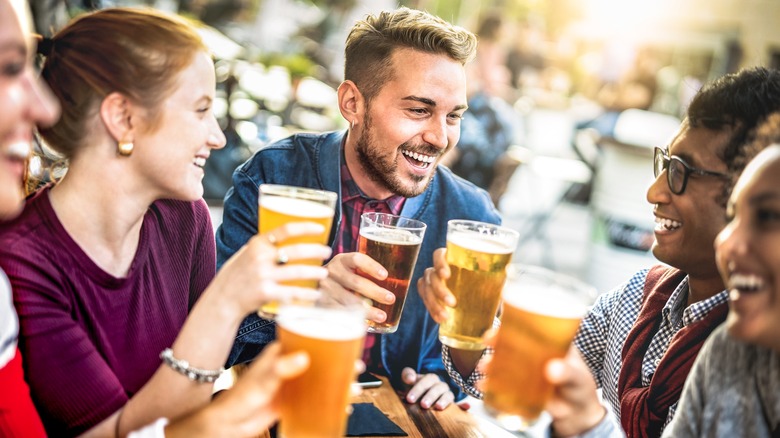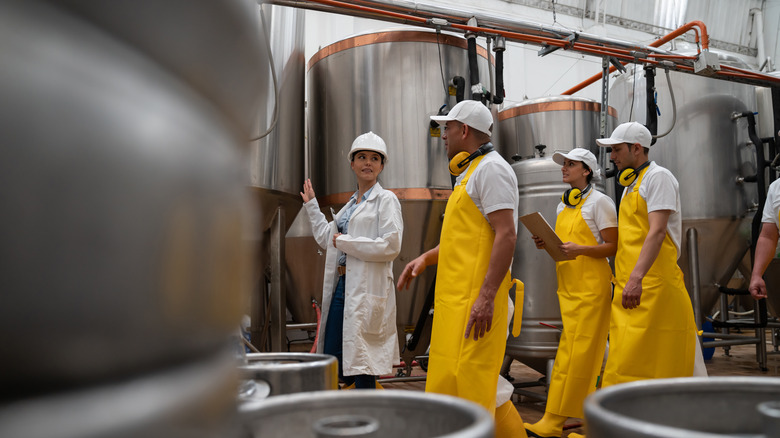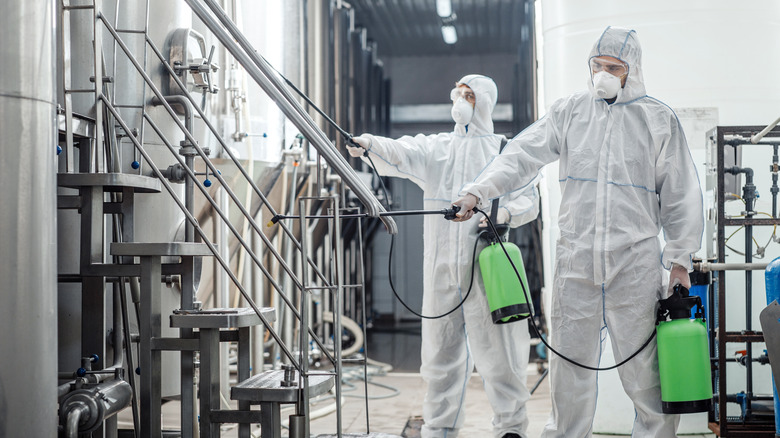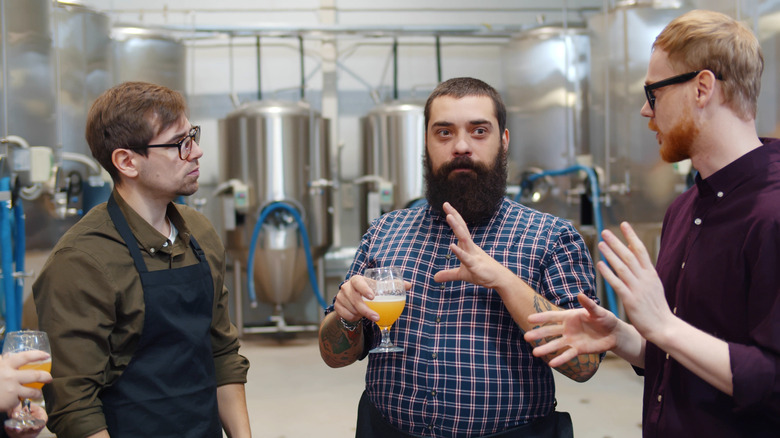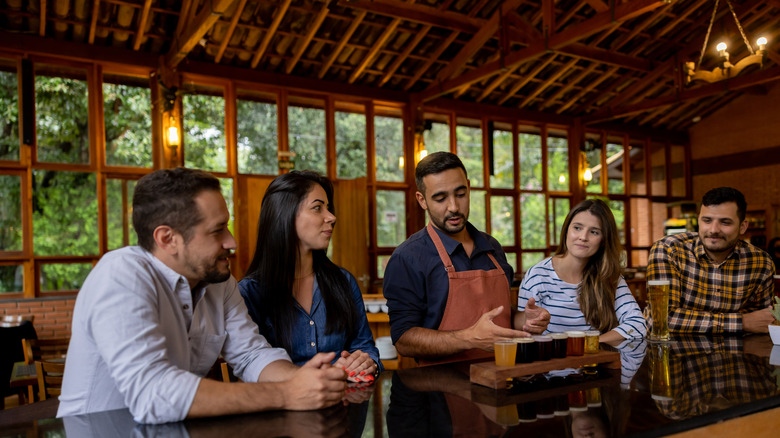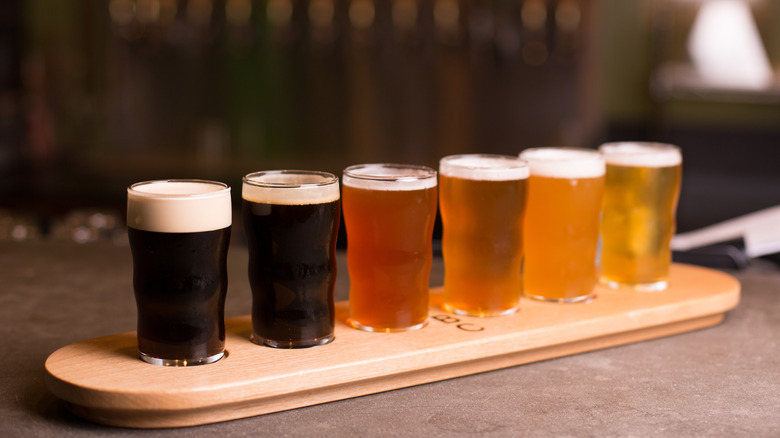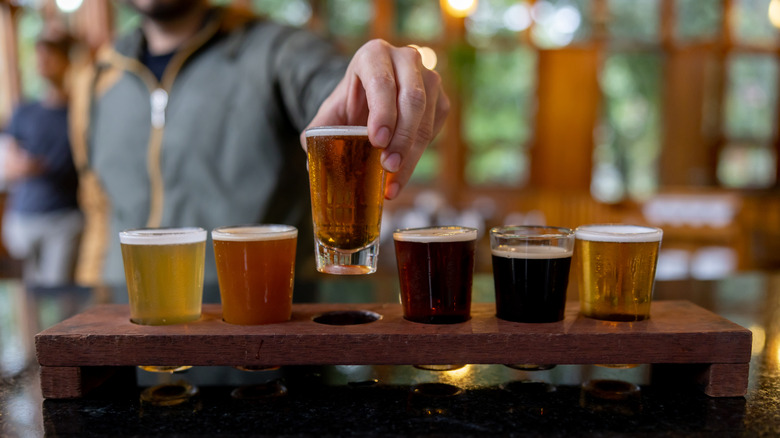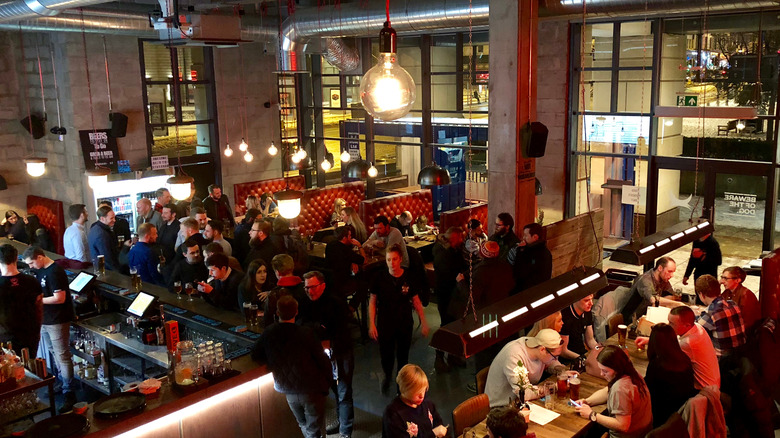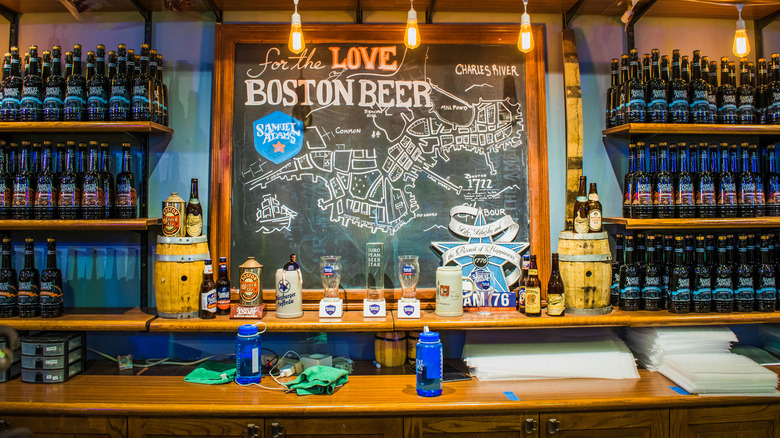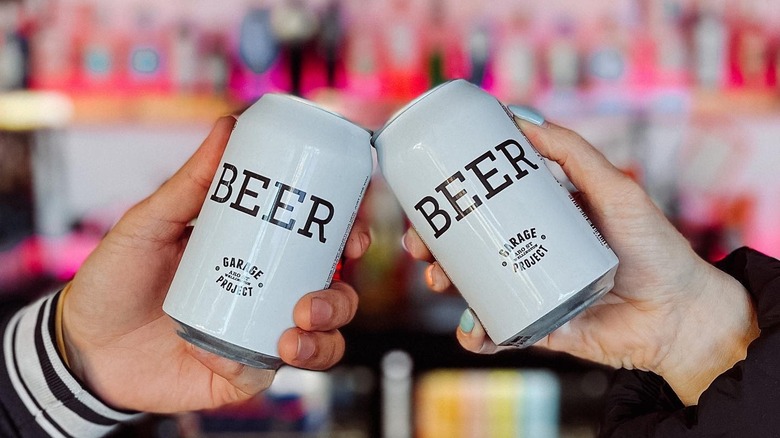12 Mistakes You're Making When Visiting A Brewery
Even for the most casual beer drinkers, visiting a working brewery can be an extremely enjoyable and enlightening experience where you get to learn about the science and manufacturing processes of beer. Most importantly, you'll also get to try a range of unique beer styles. Even if you're a beer connoisseur and it's not your first time inside one, every brewery offers something new to learn about its history and techniques, and again, you get to try the beer.
However, there are some errors that even regular brewery visitors make, like showing up unprepared, failing to follow the brewery's rules and guidelines, or simply not making the most of their visit. By knowing the most common mistakes people make when they visit a brewery, and how to avoid them, you're going to have a much more fulfilling and enriching time, while guaranteeing the same for the brewery staff and your fellow guests.
1. Not doing your research beforehand
Even if this isn't your first brewery visit, it's always worth doing some research beforehand, as by no means are all breweries the same. While it may seem obvious, the main difference between breweries is the beer they make, and you might not get as much out of the experience if you visit a place that specializes in a style you're not fond of.
If you're relatively new to the world of beer — say, for example, you've just started to branch out from mass-produced lagers — then you might not have the best time visiting a microbrewery that only brews intense imperial stouts. If you're open to anything beer-wise, then the quality of the beer and the tour experience are the next things you'll want to check out. Social media and review sites are a great way to see what other people think of the brewery, and beer rating apps like Untappd should give you a solid idea of their beer quality.
Finally, it's important to know the brewery-specific guidelines around visitation. Some breweries are open to the public every day of the week, whereas others may not have the resources to allow visitors all the time. These days, plenty of breweries are considered family- and pet-friendly, but this isn't always the case, especially as some breweries have licensed bars – known as taprooms – attached, and the laws around minors in licensed establishments can vary from state to state.
2. Dressing inappropriately
One of the key things to remember when you're visiting a brewery of any size is that breweries are active work sites. If you've never been to one before, you can expect to see plenty of industrial-scale equipment, heavy sacks of ingredients, and floors designed to handle liquid running off from tanks.
As a rule of thumb, it's a good idea to dress for a brewery as if you were dressing for a construction site. While you won't need to bring your own hard hat and high-vis jacket – breweries tend to provide these if it's considered necessary – durable, closed-toe shoes with a grippy sole are a must if you're going for a walk on the brewery floor. Brewing equipment also tends to be set up in large open spaces that are known for getting pretty chilly, especially if you're standing still listening to a tour guide, so make sure you layer up just in case.
Additionally, if you plan on hanging around after your tour for a tasting, bear in mind some taprooms are set up outside. That means you'll want to check the weather before you go and bring sunblock or wet weather clothing depending on the forecast.
3. Touching the brewing equipment or ingredients
Brewing is no different than any other type of food production in the sense that hygiene is an extremely important part of the process. In fact, many in the industry would argue that brewing beer requires above-average attention to cleanliness.
Any reputable brewery will be sanitizing all of its equipment before it touches beer or any of its ingredients, so you should avoid touching anything unless you've been given express permission to do so. The brewing process is also extremely sensitive to contamination, and even a small amount of foreign yeast or bacteria can throw off an entire batch of beer that will end up costing the brewer dearly. It's also worth repeating the fact that breweries are active work sites packed with industrial equipment, so touching something you're not supposed to could at best ruin some beer, but at worst pose a danger to the staff or other visitors.
Most breweries will introduce you to brewing equipment and likely let you get hands-on with hops and grains, but they usually have things set aside for demonstration purposes. Just make sure you're washing or sanitizing your hands before and after you handle anything, and if you want to get a closer look at something, politely ask one of the brewery staff for permission first.
4. Not paying attention to your guide
Arguably the best part of visiting a brewery — aside from the beer, of course — is learning about the brewing process and the science behind beer that we often take for granted. Whether it's your first brewery visit or your tenth, you're pretty much guaranteed to learn something new and fascinating.
However, your guide is the gateway to this wealth of exciting knowledge, and if you don't pay attention to what they have to say, you're missing the best part of the experience. Truthfully, if you have zero interest in the brewing process and are only there to drink beer, you'll likely have a better time buying some unique beers and drinking them at home. Make sure you listen to what your guide has to say, especially since they'll often be laying out the safety guidelines too, and save your personal conversations until it's appropriate.
Ironically, beer geeks are often just as likely to disrupt the guide as people with a complete lack of interest, especially when they have a dozen questions or, in some cases, have a compulsion to show off their own knowledge. If you are going to engage with your guide, make sure it's an appropriate time to do so, and if you have an abundance of questions, you can always save some for the end of the tour.
5. Neglecting to ask questions
While it is polite to time your questions and give everyone in the group an opportunity to ask their own, that doesn't mean you should avoid them. In fact, the opposite is true.
Your guide will almost certainly be extremely knowledgeable about the brewery, the brewing process, and beer in general. Aside from tasting exciting new products, talking about beer and sharing their passion for it is usually one of the best parts of the brewery staff's job, and you'll be missing out on the opportunity to learn if you don't ask questions.
The beer industry is complex and far-reaching with thousands of years of history, so nobody will expect you to know everything and you shouldn't worry about asking a silly or obvious question. Showing a keen interest in brewing during your visit will pay dividends – aside from gaining a fascinating insight into brewing and solid advice on which styles of beer to explore, you'll also build a great rapport with your guide and the brewery staff. In our experience, brewers can be very good friends to have, and while it's never a guarantee, if you're respectful and eager to learn, you may even get the chance to sample special brews that aren't always brought out for the general public.
6. Not trying a range of beers
No brewery visit is truly complete without the sampling experience. However, while some may see a beer tasting as their reward for patiently sitting through an informational tour, sampling is an integral part of the learning experience.
A common mistake people make when sampling beers is sticking to the styles of beer they enjoy and not being a little adventurous. This isn't to say you should avoid the beers you like, but that sampling a range of different styles is a chance for you to apply what you've learned on the tour. For example, you might hate dark beers, but you'll gain a deeper understanding of how beer is made when you can associate its roasty chocolate and coffee flavors with the type of grain that's used.
You may have always thought you hated hoppy beers, but before now, didn't realize just how much variety there is in terms of flavor and aroma, or how hops can change a beer's properties depending on when they're added to the brew. Lastly, the more obvious reason for trying a range of beers is that unless you're already a beer fanatic, there's a great chance you'll discover a new style that you fall in love with or a more palatable version of a style you thought you didn't like.
7. Overindulging in samples
As much as it's important to try a selection of beers when you visit a brewery, there's a reason it's called "sampling." We're still talking about drinking alcohol, so it's crucial to know your limits and drink responsibly.
Managing your alcohol intake at a brewery can be trickier than usual. Even if you're sticking to small samples, it's fairly common for craft beers to boast a higher alcohol content than the stuff you might be used to. Standard IPAs can sit around the 5-6% ABV mark, with triple IPAs getting as high as 10%, and some imperial stouts can match wine in terms of strength. For this reason, many breweries offer their stronger beers in smaller serving sizes, but this isn't always the case, so make sure you're keeping tabs on what you're drinking and how alcoholic it is. Your best option is to avoid full-sized serves and opt for a tasting flight that will let you try more beers in lower quantities.
Finally, it's crucial to make your travel plans to and from the brewery before you set off. If you're drinking, you won't be able to drive home afterward, and if you don't have a designated driver, you'll need to make sure you have transport arranged for after your visit.
8. Arriving too late in the day
As we mentioned earlier, the visiting hours for breweries can vary wildly, but if you've done your research, you shouldn't have any issues when you arrive. However, even if you know you'll get there before closing time, it's better to turn up earlier in the day.
By giving yourself plenty of time, you're not going to feel rushed through the experience and will have more time to learn, relax, and try delicious beers. You're also giving yourself a better chance of sampling the best beers, as some of the more interesting kegs may be limited, and once they're gone, they're gone.
Lastly, arriving with plenty of time is more courteous to the staff who won't be put in an awkward position if you turn up just before closing time, expecting the full tour. Even if the brewery is good enough to squeeze you in at the last minute, you may not get the best experience and will lose out on time to ask questions or sample beers.
9. Forgetting to make a reservation in advance
Although some breweries might not require you to book in advance, the majority of them will, especially if you're expecting a tour of their operation. If you decide to risk turning up without a reservation, especially when the brewery requires or recommends it, don't be surprised if you're left disappointed when you arrive.
Even if a brewery doesn't require bookings, you should always contact them ahead of time to let them know you're coming, especially if it's a large group. When the brewery knows how many people to expect, they can make sure they have enough staff available to take care of everyone's needs and maximize efficiency if there are multiple groups.
Ultimately, making a reservation will make it easier for the brewery to give you the best experience possible, and it's also a great way to clarify their visitor rules and guidelines. Plus, if you're visiting the brewery for a specific reason, like a birthday party or corporate event, they might be able to accommodate special requests if you give them enough notice to prepare.
10. Skipping out on the store
Back in the day, breweries used to sell beer to customers straight out of the cellar door. Interestingly, the term "cellar door" has stuck around, but it's nowadays it's in the form of a regular store inside the brewery.
The cellar door is where you get the chance to buy beer to take home with you. It's a great opportunity to try beers you didn't get to sample during your visit, load up with some of your favorites, and get your hands on rarer brews that you might not find anywhere else. Many breweries also sell "growlers" – large, resealable jugs that can be filled with fresh draft beer straight from the tap. Some places will take a deposit for a growler, while others will let you buy them outright. If you happen to live relatively close to the brewery, you can stop by whenever you've finished one beer and refill your growler with another.
However, personal benefits aside, buying beer from the store goes a long way to supporting the brewery, and the sales go towards financing and growing their operation. This might not be the case if you're visiting a huge, well-known brewery, but it's especially true for smaller outfits that rely on multiple income streams to keep the lights on.
11. Not tipping the appropriate staff
Although there are certainly worse jobs, hosting brewery visits is still plenty of work. Guides have to be passionate, knowledgeable, and sociable, and in smaller breweries, they normally have other duties besides running tours.
While it might not always be expected, it's considered courteous to tip your guide before you leave to show your appreciation, and it's unlikely you'll end up on a tour that leaves you thinking they haven't earned one. In some instances, you might find yourself being shown around by the owner or head brewer, in which case tipping might not be appropriate or necessary, but you can always ask if you're unsure. When it comes to the taproom, the tipping expectations are the same as any other licensed venue, so you can directly tip your server or bartender, or keep an eye out for a tip jar at the bar. In situations where you don't think tipping is required, you can always show your thanks and support by stopping by their store and purchasing beer or merchandise to take home.
12. Not promoting the brewery after your visit
After visiting a brewery and buying their beers, the best way you can support them is by promoting them. Most small operations won't have much in the way of a marketing budget, so they rely on their customers to champion their brand.
The quickest and easiest way to promote the brewery is by leaving a review online, either through social media or on review websites like TripAdvisor or Google. If there's any staff that you feel really made your visit special, like your guide, make sure you include their name in your review so they get the kudos they deserve. You can also use apps like Untappd to review individual beers and leave your own tasting notes. Tagging yourself at the brewery and sharing pictures from the day on social media is another excellent way to help boost their profile, especially if you buy and show off branded merchandise from their store.
Finally, when you're picking out beers to buy for home, think about whether you know any beer lovers with a birthday coming up. A lot of breweries sell gift sets, especially around the holidays, and not only do they make unique presents, but they're an excellent way to introduce more people to their beer.
